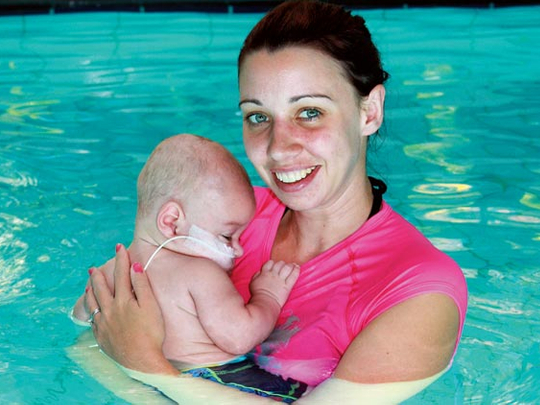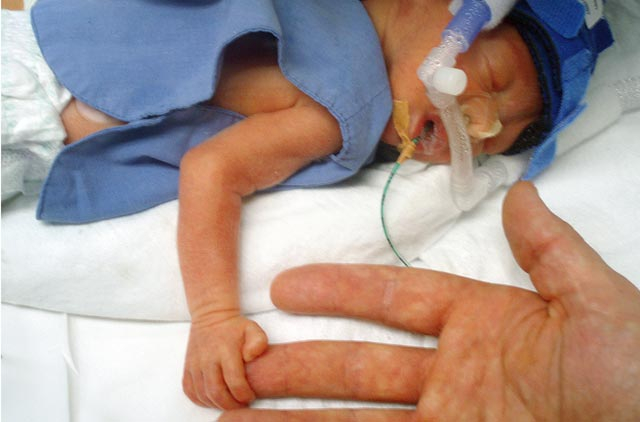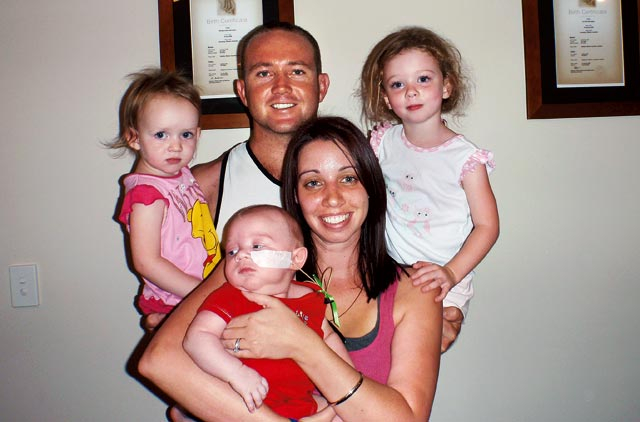
As I bent down to give my daughters a peck on the cheek they rested their tiny hands on my swollen belly. “How long until you have the baby, Mummy?” three-year-old Honey asked.
“Not long,” I replied, as my unborn baby kicked inside me. I was 28 weeks pregnant with my third child. Both Honey and Lux, 18 months, were born eight weeks premature so I was convinced this child would make an early appearance too.
My husband Josh, then 25, worked as a fly-in-fly-out scaffolding supervisor in the Pilbara region of West Australia and was away for weeks on end. Although he wasn’t around as much as he’d like he called all the time.
“How are you feeling today?” he’d ask. “Tired,” I’d reply but luckily I had my mum, Chris, 52, who was always popping round to lend a hand.
“Let me take the girls out so you can rest,” she said on August, 20, 2009.
That afternoon, as I waddled around the house preparing for the baby’s arrival, I started bleeding. I called a cab to take me to my local hospital, Joondalup Health Campus. Calling Josh, I explained what was happening. “I’ll be fine,” I said confidently. “I’m sure it’s nothing.”
By the time I arrived ten minutes later I was having contractions.
“This baby has to come out now,” the doctors said. I was whizzed into surgery. A few hours later my baby boy Hunter, weighing a tiny 1.4kg, was delivered by emergency C-section.
I was out of it but heard that they were transferring Hunter to another hospital with a specialist baby unit. Josh was flying back, but before he even arrived our little boy had been moved again to Princess Margaret Hospital, in Perth. We rushed to see him for the first time.
“My son,” Josh said, welling up, as he took in the wires and alarms all over our baby. “He’s so tiny.” I put my finger into the hole in the side of the incubator. Our son didn’t have the strength to grip it, but he was gorgeous.
The next day, as I gazed into Hunter’s humidicrib, I noticed his little body had started to twitch. “Something’s wrong with Hunter,”
I panicked, alerting the doctors.
They ran tests but it took a few days before they had a diagnosis. “Your son has periventricular leukomalacia,” the neurologist said when Hunter was just one week old.
Also known as PVL, he explained that premature babies were at the greatest risk of the disorder. Hunter’s spasm was due to a lack of oxygen or blood flow to the white matter of his brain and had caused parts of his brain to die.
“It means Hunter could suffer delayed development and will develop epilepsy and cerebral palsy,” he said. Hunter would be wheel-chair bound later in life. It was devastating news, but we were determined to stay positive.
I kept a vigil at Hunter’s bedside
Hunter was kept in hospital to build up his strength. Doctors said he would need medication later to control his seizures. A week later, Josh had to return to work for four weeks. “Goodbye Hunter,” he said, his voice catching. My sister Emma, 21, looked after the girls while I kept vigil at Hunter’s bedside. He was so weak his big sisters had been unable to meet their baby brother because of the danger of infection.
“When will Hunter be home?” Honey often asked. “Soon as the doctors get him better sweetheart,” I told her. “He’s just a bit sick.”
Finally, when Hunter was nine weeks old he came home. He weighed just 2kg and was on medication to control his seizures.
The girls, seeing Hunter at last, adored him. He lay between them as they played with their dolls. Honey chatted away as if he understood every word and Lux showered him in kisses.
Despite his medicines Hunter’s seizures got worse. After constant visits to the hospital he was diagnosed with sleep apnoea, meaning the walls of his throat closed when he was sleeping, causing him to stop breathing for a while.
We were given an apnoea machine. “Sensors go on his chest and set off an alarm if he stops breathing,” said the doctor.
By January it was going off about 20 times a day. “Hunter!” the girls shouted when the alarm sounded. Usually that was enough to give him the wake-up call he needed and re-started his breathing.
I refused to be overwhelmed by panic
Hunter’s prognosis was bleak but in early February, as the girls played with him, he suddenly cooed and smiled.
“Did you see that?” I asked excitedly. Honey nodded. “He smiled,” Honey said, desperately encouraging him to do it again.
Josh had originally trained as a massage therapist and would spend ages soothing Hunter by gently massaging his tiny body.
On February 17, 2010, I’d just waved Josh off to the airport for work when Hunter’s alarm sounded. “Wake up,” Honey said, peering into his cot. When Hunter didn’t respond I picked him up and gave him a gentle shake. He was limp and not breathing.
“Come on Hunter,” I said, trying not to let the girls hear the panic in my voice.
“Wake up Hunter,” Honey joined in. Still he didn’t respond, so I started to perform baby CPR. Suddenly, he gasped and came to but seconds later he lurched into a fit and stopped breathing again. Trembling, I called the emergency number while massaging his tiny heart.
“He’ll be OK,” I said, reassuring the girls as they stood watching with terrified looks on their faces. Once more, Hunter came out of the apnoea spell, vomited then had another one.
Refusing to let panic overwhelm me, I started giving CPR again and then, thankfully, the paramedics arrived. As they took over, I got my neighbour to look after the girls and rang Josh. He was just parking at the airport. “Turn back. Hunter’s stopped breathing and an ambulance is taking him to hospital,” I said.
He didn’t hesitate.
“I’ll meet you there,” he said. I went in the ambulance with Hunter to the Princess Margaret Hospital. All the while his apnoea alarm was beeping repeatedly.
When he came out of an attack and opened his eyes I noticed something odd. It was as though he was staring straight through me.
“He can’t see me,” I said to a doctor.
“It’s his brain condition,” the doctor replied.
“No, he can normally see me,” I said. “This is different.” My instincts told me something was seriously wrong.
Doctors took blood tests but Hunter was going downhill fast. At 11pm he slipped into a coma and by the next morning he was flitting constantly and in and out of sleep apnoeas. A few hours later Hunter stopped breathing completely and had to be put on oxygen.
“This is all that’s keeping him alive,” Josh said, fighting back tears. Our little boy looked so vulnerable. “You’ve got to fight,” I willed him.
Eventually Hunter was seen by the neurologist at 2pm and a doctor came to us with the results of blood tests they’d taken. “Hunter has respiratory acidosis,” the doctor said. It was a condition in which the body’s organs, starved of oxygen produce more carbon dioxide and turn toxic.
“He can’t breathe on his own now,” the neurologist said. “He hasn’t got long.” Terror gripped me, making my chest tighten, and my legs weak. “The machines are keeping him alive,” I cried to Josh.
He shook his head, bewildered.
I was inconsolable. My baby was slowly dying. Looking at Hunter, so vulnerable and tiny, I knew we had an impossible decision to make. Did we let him go or keep fighting? Josh and I had always had the view that it was cruel to be kept alive artificially when all hope was gone. But could I let my baby die?
Cuddling Hunter to me I whispered in his ear, “I will fight for you as long you fight.”
At that very moment his oxygen levels plummeted. It was as if he was telling me it was OK to let go. Sobbing, I gently stroked Hunter’s soft cheeks. He looked so tired and weak it wasn’t fair to let him go on struggling.
Our minds were made up. “No more oxygen, he’s had enough,” I said to the doctor. Josh nodded. It was February 18, 2010. At 4pm Hunter was taken off all the machines.
“His breathing will gradually slow down and then his heart will stop,” the doctor explained.
I gulped back sobs.
Sarah Kelly, an organ donor co-ordinator for Donate Life, came to see us after I said we wanted to donate Hunter’s organs. “Even though Hunter’s organs are toxic, his heart valves will be unaffected,” she said. I grabbed Josh’s hand for support.
“I don’t want anyone else to feel our pain,”
I said to Josh. “If we can stop another parent going through the loss of a child then we have to.” Josh hugged me. “I agree,” he cried.
A kind Red Cross volunteer, Jan Lay, arrived to offer us support. A trained neonatal nurse, she understood what we were going through.
At 6pm the girls arrived with my sister and mum. “Why are you crying, Mummy?” Honey asked. I steeled myself.
“Hunter won’t be coming home darling,”
I explained. “Would you like to say goodbye?”
Both Honey and Lux walked over to Hunter’s crib and stroked his head. “I love you Hunter,” said Honey, giving him a kiss on the head. Lux kissed her baby brother on the nose. She was still young but I think she understood she wouldn’t see him again.
When the girls left, Josh and I took turns holding Hunter, kissing and cuddling him for the last time.
“If I’d known I’d only have you for such a short time I’d have found a way to be home more,” Josh sobbed, nuzzling his son. I held my son, drinking in his warmth and sweet smell, kissing the top of his head.
“I love you so much Hunter,” I cried. “I hope we’re doing the right thing for you.”
We didn’t want to say goodbye
By 9pm Hunter was taking just one breath each minute. Sarah, the organ donor co-ordinator, was filling in paperwork. “Jo, I’m sorry but I just need one more signature from you to make this all legal,” she said softly. Still cradling Hunter, I signed the form. At that very moment his little heart stopped beating.
Silence hung in the air. Josh clung to me as I cradled Hunter in my arms. We were too distraught to speak.
“You can stay with him as long as you want,” said a palliative care nurse.
Taking turns to hug him we both wept, not wanting to say goodbye. “I love you,” I whispered, kissing Hunter. Then he was taken away. He would have surgery to remove his heart valves. I tried to focus on how much his death would help someone else, but it was hard.
Hunter’s was so young but he had touched so many lives. At his funeral more than 200 people came to pay their respects.
Lux put a dinosaur in his coffin while Honey placed a rattle and we lit a candle. At the end of the service we released balloons and the girls blew out Hunter’s candle.
A week later, Sarah called. “There’s a one-year-old boy in Sydney who was gravely ill,” she said, explaining that Hunter’s heart valves had been donated to him. “Thanks to Hunter he’s now going to be OK.”
I burst into tears, overwhelmed with sorrow and happiness all at once.
“You know Hunter died because his brain didn’t work,” I said to the girls. They nodded.
“Well, we gave Hunter’s heart to another baby. Now that baby is alive and Mummy’s heart doesn’t hurt anymore,” I said. They smiled.
A few days later I was in the supermarket with Honey when she started talking to the lady on the checkout.
“My Mummy doesn’t have to cry anymore because another baby has got my brother, Hunter’s heart,” she said.
The poor woman looked horrified.
Of course, I’ve shed a lot of tears. But there’s truth in Honey’s words. It is a comfort to know my beautiful boy gave another child life.
Through Sarah, I wrote to the parents of the little boy Hunter saved. I told them not to dwell on our grief. “Enjoy your son,” I wrote.
Hunter would be three now. We celebrate his birthday by releasing balloons. Not a day goes by where I don’t think of him.
Nothing can bring my beautiful boy back to me but he left a legacy that will last a lifetime. In another happy little boy my Hunter lives on.
Jo Harrington, 29, Carramar, Western Australia













